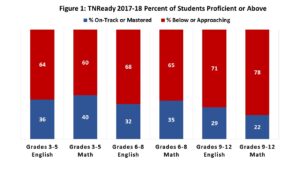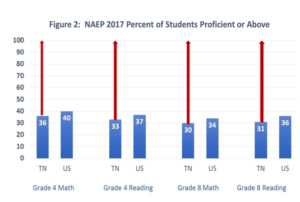An Urgent Need for Change
In the last decade, Tennessee’s education reforms have driven historic improvements, resulting in high academic standards, standards-aligned assessments of student progress, and accelerated growth in statewide academic achievement for students in grades 3 through 12.

But despite the improvements, student proficiency still falls far short of Tennessee’s goals.
TNReady, Tennessee’s standards-aligned end-of-year assessments, reveal that the majority of Tennessee’s students, in all tested grades 3-12, are not proficient in reading and math. See Figure 1.
The Nation’s Report Card (NAEP) tells a similar story. Despite Tennessee being the fastest improving state in the country, proficiency rates still rank it in the bottom half of all states. See Figure 2.
Especially striking is that by 3rd and 4th grades Tennessee’s students are already significantly behind, with nearly two-thirds not proficient in English and math.

If a student is not proficient by third grade, they are four times more likely to drop out of high school and 60% less likely to pursue a post-secondary degree. As Tennessee data demonstrates, once students fall behind in third grade, they tend to stay behind, or fall further, in subsequent years.
Low proficiency in third grade is an indication that the quality of children’s learning experiences prior to 3rd grade requires significant improvements.
Learning does not begin in third grade. In fact, the brain develops more in the first five years than at any other time during a person’s life. Deficits in early literacy and math skills have been documented beginning at 9 months and widening from there along family income lines. Early literacy and math skills, as well as early social skills, at kindergarten entry, are strong predictors of future academic success.
K-12 educational achievement and post-secondary success require a strong early learning foundation, from birth through third grade.


